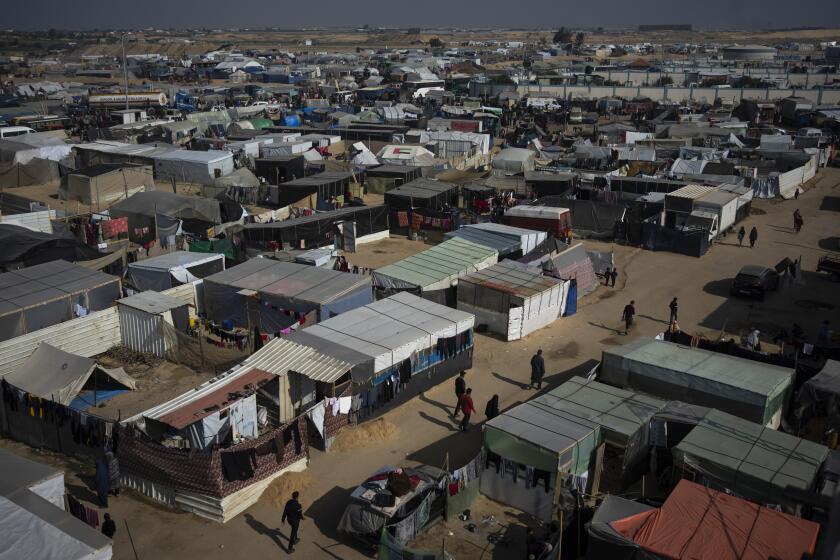PERSPECTIVE ON CHILDREN : Most Vulnerable, Least Protected : 134 heads of state have signed it; the United States should ratify the U.N. Convention on the Rights of the Child.
In the first week after the fighting began in the Persian Gulf, we interviewed a group of schoolchildren about their impressions of war. Among the most vivid images of that experience was the third-grade girl who feared that, one by one, all of the members of her family would go “poof” and never return.
The fear in that child’s face, and in so many other young faces at that school, underscored an important point: Children do not have to understand war to suffer from it. Too often, as nations divert their energy and resources toward war, it is the children who most feel the consequences of neglect. At this time of crisis, our commitment to children here should at the very least match out commitment to the war overseas.
I hope, now more than ever, that the United States will join the more than 60 countries that have ratified the United Nations Convention on the Rights of the Child. The convention, which was drafted by UNICEF, the U.N. Center for Human Rights and other U.N. agencies, governments and non-government organizations over a period of 10 years, was adopted unanimously by the General Assembly Nov. 20, 1989. It guarantees children the right to survival, protection and development in a world where each is becoming increasingly difficult.
When the necessary 20 countries ratified the convention last year, its provisions became legally binding in those countries and subsequently in others that followed suit. America is still not one of them.
President Bush is not among the 134 heads of state who have signed, showing their intention to at least give it serious consideration. The Senate has formally urged the President to forward the convention for approval, but the White House has said it is not yet ready to make a decision.
According to most media reports, there are two major objections to the convention in Washington. First, it outlaws the death penalty for children. The vast majority of the world’s governments recognize that killing children is wrong--only Iraq, Iran, Bangladesh and the United States still allow capital punishment of children.
Anti-abortion forces also oppose the convention because they believe that the rights it guarantees must be extended to the unborn as well. But the convention is neutral on this question for good reason. Regardless of who is right or wrong in the abortion debate, there is virtually no chance of winning a consensus on the rights of the fetus in this country, never mind the rest of the world. The millions of children who would be protected by the convention should not suffer for it, and should not be our pawns in a political debate.
I hope that the President will also consider these important points:
-- America’s children, especially those who are now homeless, poor or hungry, deserve the rights that the convention would accord them. We tend to think that ours are the healthiest and most fortunate children in the world. They are not. In fact, according to UNICEF, the United Nations children’s fund, 20 nations have lower infant mortality rates than the United States, including Ireland, Hong Kong and Singapore. We rank 22nd in the mortality rate for children under 5 and, according to the Children’s Defense Fund, we have 100,000 homeless children. And if you think that American children are not children of war, think again. In the next school day alone, in the United States, 135,000 children will bring a gun to school.
-- The ratification of the convention would charge all of us with accountability for these alarming trends, during times of peace or war, and would send a powerful message to the international community that has always looked to America for leadership.
-- Child neglect in the United States is a tragedy, yet the government is not held legally responsible. If our children were dying in plane crashes, were being driven from their homes by arson or given guns by terrorists, public outrage would result in a flood of investigations, indictments and hearings. Our crisis is passive--it stems not from action but from inaction. The convention gives us the opportunity to make the welfare of our children a point of law.
There can be no doubt that the President is at the moment focused on pressing matters. But that’s exactly why he should recommend the convention now. There is no better time than war to restate and implement the values we are fighting for.
The Convention on the Rights of the Child is not an issue for Republicans or Democrats, conservatives or liberals. In 1988, George Bush said, “Our national character can be measured by how we care for our children.” He was right.
I hope he will take a moment now--a moment away from the fighting--to consider recommending this convention to the Senate. When he does, he’ll have added to our strength the moral factor that we live by the values we profess--that the frightened little third-grader we saw and children everywhere will have acquired their own rights.
More to Read
Sign up for Essential California
The most important California stories and recommendations in your inbox every morning.
You may occasionally receive promotional content from the Los Angeles Times.






